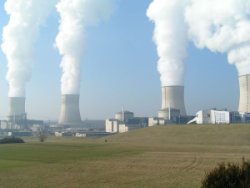A military attack on Iran would be a serious blunder
28 Oct, 2008 04:04 pm
The coming American Presidential election has again focussed attention on Iran?s nuclear activities. Will the new President order the bombing of Iran?s nuclear facilities or support an Israeli attack?
 |
Uranium enrichment involves increasing the percentage of the fissile isotope uranium-235 in uranium from its natural value of 0.711 percent. The NPT allows a Party to enrich uranium to a level needed for use as fuel for civil nuclear-power reactors (about 3.5 percent in uranium-235), but not to the much higher level needed for use in nuclear weapons (about 90 percent in uranium-235), provided that the enrichment activity is inspected by the IAEA.
Iran correctly claims that it has, under Article IV of the NPT (4), Ďan inalienable rightí to enrich uranium for use as civil nuclear fuel. It plans to build a number of nuclear-power reactors (its first one has been constructed at Bushehr by Russia) and wants to produce the nuclear fuel for them indigenously. It promises neither to violate its NPT obligations nor to use its uranium enrichment technology to produce highly-enriched uranium.
Because Iran hid its uranium enrichment activities for many years, the Security Council wants Iran to stop these activities until the IAEA can vouch for its peaceful intentions. The Security Council also wants Iran to suspend its work on the construction of a heavy water reactor at Arak, which could produce plutonium, an alternative fissile material to uranium for use in a nuclear weapon device. But Iranian President Mahmoud Ahmadinejad has repeatedly said that Iran will not give in to international pressure (5).
The IAEA does, however, state, in its September 2008 report, that it has found no evidence that Iran has diverted material for nuclear-weapon purposes and that all the nuclear material at its Natanz Uranium Enrichment Plant remains under the IAEAís "containment and surveillance". Nevertheless, there is still talk, especially from Israel and some influential Americans, about the need for a preemptive military strike on Iranís nuclear facilities.
A military strike against Iranian nuclear facilities would have to contend with: a large number of targets; well-protected, hardened and hidden facilities; inadequate intelligence; and the survival of key scientists and technologists, even though a number of them may be killed. It would be counter-productive. After it, Iran would almost certainly embark on a crash programme to make one or more nuclear weapons. In the aftermath of an attack, there would be much support for such a move from the Iranian population, including the scientific community. And Iran would probably withdraw from the NPT, putting an end to IAEA inspections and the prospect of containing the development of a nuclear weapon.
Currently, much, if not all, of Iranís nuclear efforts are devoted to its civil nuclear programme (6). Most estimates predict that if Iran continues along its current path it will take it some years to build and deploy a nuclear weapon. A military attack would, however, provoke it to commit itself entirely to producing a nuclear weapon using all available assets, including nuclear equipment and nuclear materials damaged in an attack, and buying additional supplies on the black-market. It could probably produce a nuclear weapon in no more than a year or two.
According to the IAEA report, Iran now has 3,820 centrifuges operating at 85 percent efficiency at its Natanz plant. These have produced 1,056 pounds (480 kilograms) of uranium enriched to about 3.5 percent, nearly 80 percent of what it would require, after further enrichment, to produce its first nuclear weapon. It is much easier to enrich uranium from 3.5 percent to the 90 or so percent required for nuclear weapons than to enrich natural uranium to 3.5 percent. Three thousand centrifuges of the type currently operated by Iran at Natanz could theoretically produce about 40 kilograms of highly-enriched uranium a year, enough for two nuclear weapons a year (7).
Iran has presumably made preparations to enable it to resume its nuclear programme as quickly as possible after a military attack. It has probably, for example, hidden a number of gas centrifuges and a stock of uranium hexafluoride in well-protected facilities.
Letís hope that the new American President realizes that a military attack on Iran would make no sense and would probably provoke it to accelerate its nuclear-weapon programme, if it has one. If not attacked, Iran will not acquire a capability to fabricate nuclear weapon for some years. There is ample time for diplomacy to work.
References
1. IAEA Board of Governors, Implementation of the NPT Safeguards Agreement and relevant provisions of Security
Council resolutions 1737 (2006), 1747 (2007) and 1803 (2008) in the Islamic Republic of Iran, Report by the IAEA Director General, Vienna, 15 September 2008.
2. UN Security Council Resolutions are obtainable from
www.un.org/documents/scres.htm
3. David Albright, Jacqueline Shire, and Paul Brannan, IAEA Report on Iran: Centrifuge Operation Significantly Improving; Gridlock on Alleged Weaponization Issues, Institute for Science and International Security, ISIS Report, 15 September 2008.
4. Text available on
www.disarmament.un.org/wmd/npt/npttext.html
5. Julian Borger, Mahmoud Ahmadinejad hails Geneva talks on Iran's nuclear programme a step forward, The Guardian, 21 July 2008.
www.guardian.co.uk/world/2008/jul/21/iran.nuclear
6. Sharon Squassoni, Iranís Nuclear Program: Recent Developments, US Congressional Research Service , The Library of Congress, Washington, 6 September 2006. Available at
www.fas.org/sgp/crs/nuke/RS21592.pdf
7. Frank Barnaby, Would Air Strikes Work? Understanding Iranís nuclear programme and the possible consequences of a military strike, Oxford Research Group, Briefing Paper March 2007. Available on:
www.oxfordresearchgroup.org.uk
-
12/12/12
¬ďPeak Oil¬Ē is Nonsense¬Ö Because There¬ís Enough Gas to Last 250 Years.
-
05/09/12
Threat of Population Surge to "10 Billion" Espoused in London Theatre.
-
05/09/12
Current Commentary: Energy from Nuclear Fusion ¬Ė Realities, Prospects and Fantasies?
-
04/05/12
The Oil Industry's Deceitful Promise of American Energy Independence
-
14/02/12
Shaky Foundations for Offshore Wind Farms







 Read more
Read more
For example, since their economy relies quite heavily on their oil exports, couldn?t western countries profit from the low oil prices to put some economical pressures on the Iranian government?